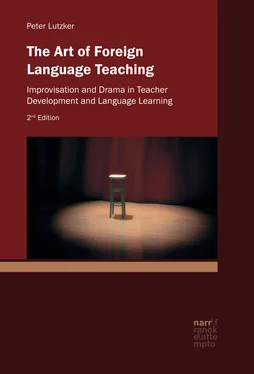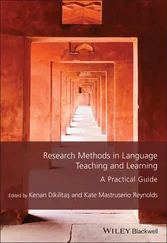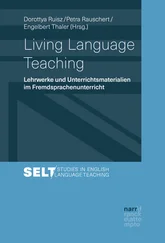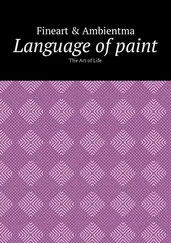4.3 Description of the Courses: Observation and Participation
Since the type of clowning courses that will be the subject of this study are generally unknown in a pedagogical and/or academic context, it becomes a primary task of the researcher to give the reader an accurate picture of what goes on in such a workshop. To achieve this, the role of an outside observer is crucial. At the same time, the subjective experiences and perspectives of the participants must also be seen as a key factor in establishing a clear picture of the work.
During the English Weeks in November, 2004 and November, 2005 in Altenberg, Germany, I attended Vivian Gladwell’s courses as an observer and to a certain degree also as an active participant. Each day, I kept a running record of the course activities and set down most of the comments made by him and the participants. At the same time, it also seemed appropriate in the context of these workshops to take part in some of the exercises and improvisations, in order to experience the course from the perspective of the participants, as well as to avoid conveying the sense of only being an external observer. This meant that my protocols were at different points briefly interrupted by my own activities as a member of the group. (The fact that a few years earlier I had taken a clowning course at the English Week and, in addition, an advanced course in the summer of 2004 in England, made it much easier for me to go back and forth between the roles of participant and researcher.) In an intensive three-day course which Gladwell gave at the Institut für Waldorf Pädagogik in Witten Annen in January, 2005, I was present only as an observer and kept a complete protocol of the sessions.
Having had the chance to experience these courses from both the standpoint of an observer as well as a participant, proved to be a significant element of between method triangulation , insofar as each of these roles offered important insights which were only realizable through adopting these perspectives.
In order to gain a deeper understanding of the background and rationale of such courses, it is necessary to go beyond a description of the workshops and to explore the nature of clowning itself. In this context, it became decisive to elicit Gladwell’s own thoughts on his work. Hence the interviews which I conducted with him proved to be an essential element of this research. All of the sessions were recorded and later transcribed.
From March, 20–22, 2005, I was a guest at his house in Castel Magnoc, in Southern France. In the course of these three days I had the opportunity to conduct seven semi-structured interviews with him, each lasting between 60–90 minutes. It is an accepted research paradigm that an interview should occur in a social setting in which people can converse in a relaxed and undisturbed manner. In this respect, these interviews were conducted in ideal circumstances.208
The general framework and design of the interviews followed the underlying principles of interviewing which Irving Seidman has elucidated. Seidman suggests a three-part format beginning with general and personal background material, followed by a descriptive phase focused on contemporary experience, which in this case involved extensive questioning about each consecutive phase of a clowning workshop, and finally more general reflections on the meaning of the work.209
In keeping with accepted research practices, he had full access to the transcriptions and was given the freedom to change any of the wording.
4.5 Research Inquiry and Data Triangulation
The heart of this empirical study consists of the 55 replies from teachers who had taken part in his courses. As mentioned above, the fact that he has regularly given clowning courses for Waldorf language teachers since 1996, offered opportunities to assess data coming from a wide range of in-service courses occurring at different times, in different contexts and in three different countries. Hence, a key element of this research data can be seen as the extensive possibilities of data triangulation which this range of courses over a decade offers. On a longitudina l level, the responses to the courses that were received were written at very different points in time, ranging from replies in which participants write about courses they had just taken in the previous week, to other participants who are reflecting on courses which occurred many years earlier. The fact that the structure and content of the courses themselves have remained largely constant means that in attempting to assess the short-term and long-term significance of these courses, the possibility of a high degree of time triangulation of the research data is introduced. Thus, distinctions and parallels can be drawn between the short and long-term effects of such courses. This element of time triangulation can be considered a particularly significant aspect of this study, since the question of the long-term effects of in-service courses must be considered one of the most critical questions in this area of research.
Another element of data triangulation can be seen in the space triangulation which the participants’ responses offer. The fact that the courses took place in three different countries and that there has also generally been a strong international component to all the courses is reflected in the responses which were received: from the 54 responses 31 are from Germany and the rest are from other countries including Austria, Switzerland, England, Russia, Estonia, Lithuania, Sweden, Finland, Israel, France, Japan and the Ukraine.
A further significant difference between these courses can be found in the types of participants who took part. The Baltic Seminar , for instance, was primarily designed for teachers in their first years of Waldorf teaching, as opposed to the English Week which has a much higher percentage of very experienced Waldorf teachers. Hence this data offers the opportunity to evaluate possible differences between how experienced and less experienced teachers perceived the work.
4.6 Research Inquiry – ‘Thick Description’
After originally considering the option of formulating a detailed questionnaire, a much more open modus of inquiry was adopted in the form of a letter designed to offer a number of suggestions and ‘impulses’ for the participants. A copy of the standard letter is printed below. (In those courses in which I participated, an almost identical paper without the first line was handed out to the participants at the end.)
Dear _________
I’m writing to you now because according to his records you attended one of Vivian Gladwell’s clowning courses. In the context of my Ph.D. research, I’m trying to assess the possible effects of Vivian’s workshops. (This is, of course, done with Vivian’s blessings.) Thus, I am asking you to please take some time when you can find it and write down anything/everything that you can think of in terms of what you remember of the course, your experiences and feelings back then, in the meantime, and how you view this now. In the context of my work, all the thoughts and feelings you can offer in this regard would be both relevant and very much appreciated. Unless you really prefer to write this in English, I would suggest writing it in German. (This assumes, of course, that your mother tongue is German. If it is not, I would appreciate your replying in English…)
All your answers will, of course, be treated as confidential and all the standard ethical practices of printed research will be followed i.e. names will be changed, background information put in a neutral context etc.
Читать дальше












